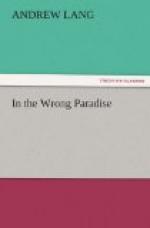I was now left standing by the altar, the attendants observing me with respect which I feared might at any moment take the blasphemous form of worship. Nor could I see how I was to check their adoration, and turn it into the proper channel, if, as happened to Captain Cook, and has frequently occurred since, these darkened idolaters mistook me for one of their own deities. I might spurn them, indeed; but when Nicholson adopted that course, and beat the Fakirs who worshipped him during the Indian Mutiny, his conduct, as I have read, only redoubled their enthusiasm. However, as events proved, they never at any time were inclined to substitute me for their heathen divinities; very far from it indeed, though their peculiar conduct was calculated to foster in my breast this melancholy delusion.
I had not been left long to my own thoughts when I marked lights wandering in the garden or courtyard whither the messenger had been sent by the old priest. Presently there came forth from the court a man of remarkable stature, and with an air of seriousness and responsibility. In his hand he carried a short staff, or baton, with gold knobs, and he wore a thin golden circlet in his hair. As he drew near, the veil of the temple was again lifted, and the aged priest came forward, bearing in his arms a singular casket of wood, ornamented with alternate bands of gold and ivory, carved with outlandish figures. The torch-bearers crowded about us in the darkness, and it was a strange spectacle to behold the smoky, fiery light shining on the men’s faces and the rich coloured dresses, or lighting up the white idol of Apollon, which stood among the laurel trees at the entrance of the temple.
III. THE PROPHECY.
The priest and the man with the gold circlet, whom I took to be a chief, now met, and, fixing their eyes on me, held a conversation of which, naturally, I understood nothing. I maintained an unmoved demeanour, and, by way of showing my indifference, and also of impressing the natives with the superiority of our civilization, I took out and wound up my watch, which, I was glad to find, had not been utterly ruined by the salt water. Meanwhile the priest was fumbling in his casket, whence he produced a bundle of very ragged and smoky old bits of parchment and scraps of potsherds. These he placed in the hands of his attendants, who received them kneeling. From the very bottom of the casket he extracted some thin plates of a greyish metal, lead, I believe, all mouldy, stained, and ragged. Over these he pored and puzzled for some time, trying, as I guessed, to make out something inscribed on this curious substitute for writing-paper. I had now recovered my presence of mind, and, thinking at once to astonish and propitiate, I drew from my pocket, wiped, and presented to him my spectacles, indicating, by example, the manner of their employment. No sooner did he behold




